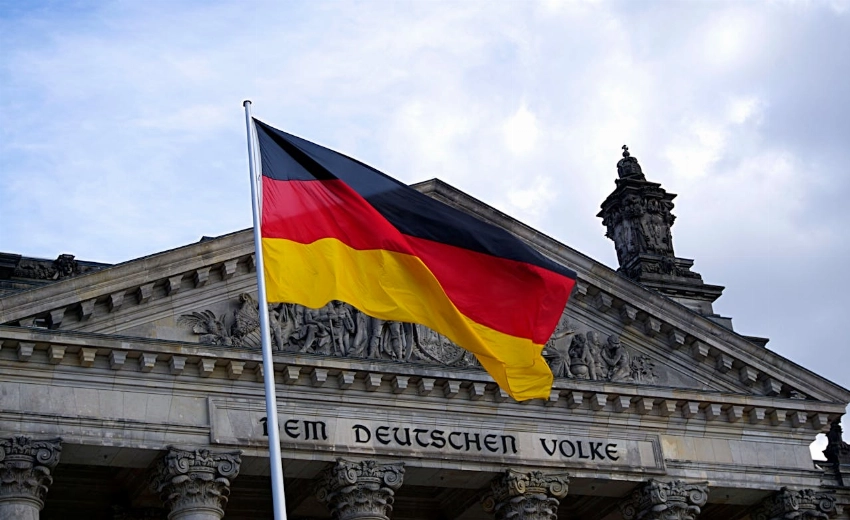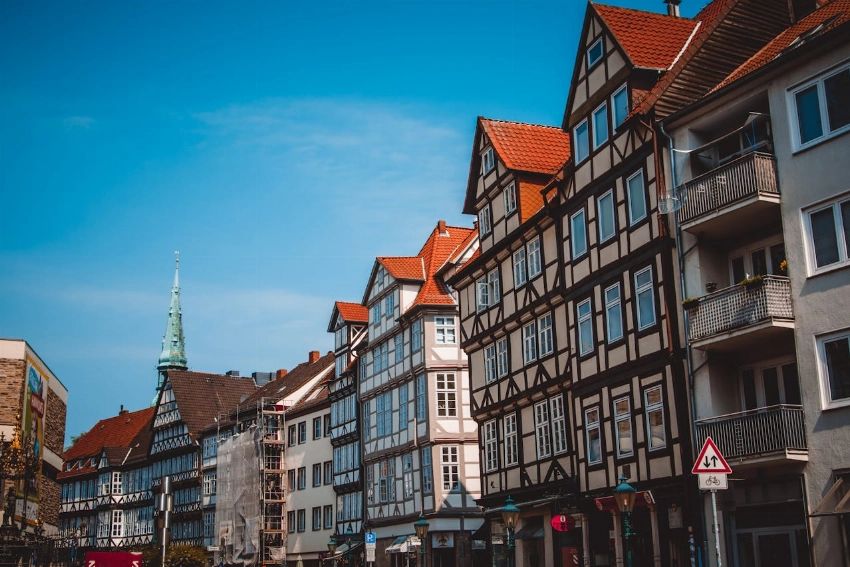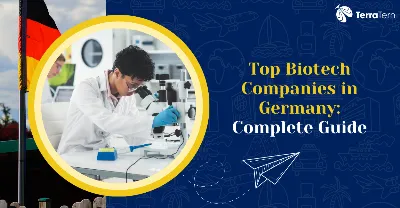Key Highlights
- Top Biotech Companies in Germany in 2025: Latest Update
- What Types of Latest Biotech Companies in Germany Operate?
- Which Are the Top Biotech Companies in Germany in 2025?
- Where Are the Latest Biotech Companies in Germany Located? 2025 Update
- What Are the Key Specialisations of German Biotech Companies in 2025?
- How Is the German Biotech Industry Performing in 2025?
- How Can the Latest International Professionals Join German Biotech Companies?
- What Is the Current Complete List of Biotech Companies in Germany in 2025?
- How TerraTern Can Help You?
- Conclusion
Germany has been a pioneer in the world in science and innovation. This reputation is a key factor for the biotech companies in Germany. The country has almost 4,000 life sciences companies, including pharmaceuticals, diagnostics, medical technology, and research services.
In 2024, the biotech industry raised €1.9 billion (2.2 billion) in investments. This is an indication of other lean years. BioNTech, Boehringer Ingelheim, and Evotec are the representatives of the world-renowned companies in Germany. The industry provides 12 per cent of the national economic performance, and approximately 16 per cent of the labour force.
Top Biotech Companies in Germany in 2025: Latest Update

Here is the list of detailed table for the top 24 Biotech Companies in Germany 2025:
|
No. |
Company Name |
Location (HQ) |
Core Focus / Specialisation |
Notable Details |
|
1 |
BioNTech |
Mainz |
mRNA therapeutics, immunotherapy, vaccines |
Acquired CureVac in 2025 |
|
2 |
Boehringer Ingelheim |
Ingelheim |
Biopharmaceuticals, animal health |
CDMO, a global top biopharma |
|
3 |
Evotec |
Hamburg |
Drug discovery, AI for biotech |
1,000+ employees |
|
4 |
CureVac (now part of BioNTech) |
Tübingen/Mainz |
mRNA technology, oncology |
Acquired by BioNTech in 2025 |
|
5 |
Bayer AG |
Leverkusen |
Pharmaceuticals, crop science |
100,000+ employees |
|
6 |
Merck KGaA |
Darmstadt |
Pharma, life sciences, performance materials |
Founded in 1668, a major life science firm |
|
7 |
Bio-Rad Laboratories |
Hamburg |
Diagnostics, antibodies, biosensors |
US-listed, German base |
|
8 |
Amgen Deutschland |
Munich |
Oncology, biopharma |
Part of global Amgen |
|
9 |
Immatics |
Tübingen |
Cancer immunotherapy (TCR-T therapies) |
Nasdaq-listed |
|
10 |
InflaRx |
Jena |
Anti-inflammatory, antibody drugs |
Nasdaq-listed Vilobelimab approval |
|
11 |
ITM Isotope Technologies Munich SE |
Munich |
Radiopharmaceuticals, targeted therapies |
late-stage products |
|
12 |
Morphosys |
Planegg |
Antibody-based therapeutics |
Leading antibody firm |
|
13 |
4SC |
Planegg-Martinsried |
Small molecules for autoimmunity, cancer |
Clinical-stage biotech |
|
14 |
Abalos Therapeutics |
Düsseldorf |
Virus-based immunotherapies |
$50M funding |
|
15 |
Ariceum Therapeutics |
Berlin |
Radiopharma, orphan diseases |
Satoreotide (FDA Orphan Drug) |
|
16 |
Breakpoint Therapeutics |
Hamburg |
POLQ inhibitor anti-cancer agents |
Spinout of Evotec |
|
17 |
CatalYm |
Munich |
Cancer immunotherapy (anti-GDF-15 antibody) |
$150M+ raised |
|
18 |
Ethris |
Munich |
Inhaled mRNA therapeutics |
Phase 2 clinical work |
|
19 |
iOmx Therapeutics |
Munich |
Oncology, kinase inhibitors |
Early-phase assets |
|
20 |
SciRhom |
Munich |
Protein (iRhom2) antibodies |
€63M Series A |
|
21 |
Seamless Therapeutics |
Dresden |
Programmable gene editing |
$25M early-stage funding |
|
22 |
Secarna Pharmaceuticals |
Hamburg |
Antisense oligonucleotides |
Phase I/II clinical programs |
|
23 |
Topas Therapeutics |
Hamburg |
Antigen-coupled immunotherapy |
Nanoparticles, autoimmune |
|
24 |
Tubulis |
Munich |
Antibody-drug conjugate platforms |
€128M Series B2 |
There is a combination of multinational giants, publicly-traded biotechs, clinical-stage innovators, and early-stage startups in Germany. These companies drive the breakthroughs in therapeutic, diagnostic, and platform technologies, and Germany is one of the finest biotech hubs in Europe.
What Are the Leading Biotech Companies in Germany?
Germany has a large number of biotech companies at the global level. They work through the therapeutics, diagnostics, and contract services segments.
Large Established Firms are:
-
BioNTech - mRNA therapeutic and cancer immunotherapy (Mainz)
-
Boehringer Ingelheim- Biopharmaceuticals and animal health (Ingelheim)
-
Evotec – Drug discovery and development alliances (Hamburg)
-
Tuebingen- CureVac mRNA technology platform [acquired by BioNTech in 2025].
-
Leverkusen- Bayer pharmaceuticals and life sciences
New Clinical-Stage Innovators:
-
Tummingen- T-cell immunotherapies
-
Tubulis Antibody- Drug (Munich) conjugates.
-
Ethris – Inhaled therapeutics (Munich) mRNA.
These companies collectively constitute the 35.3 billion biotechnology market in Germany.
What Types of Latest Biotech Companies in Germany Operate?
The biotech companies in Germany may be classified by model and area of treatment:
-
Therapeutics Development Companies
-
Biotechs in drug discovery and at the clinical stage.
-
Examples: BioNTech (Mainz), Immatics (Tuebingen), CatalYm (Munich)
-
Diagnostics and Medical Research Services
-
Molecular diagnostics, in vitro diagnostics.
-
Examples: the EUROIMMUN (Luebeck), the R-Biopharm (Darmstadt), the BioType (Dresden)
-
Contract Research and Manufacturing Organisations (CROs/CDMOs)
-
ProBioGen (Berlin), IDT Biologika (Dessau-Rosslau)
-
Provide GMP production, cell development, and testing.
-
Technology Companies on Platforms
-
Genetic modification, messenger RNA, and antibody identification.
-
Examples: Seamless Therapeutics (Dresden), ETHRIS (Munich)
-
Medical Technology and Equipment Companies
-
Medical equipment, prosthetics.
-
Sample Ottobock (Duderstadt).
-
Industrial/White Biotechnology
-
Enzymes, bio-manufacture, sustainable process.
Regarding BIO Deutschland, a quarter of the German biotech companies are diagnostics-driven, and a quarter are therapeutics-driven.
Also Read: Germany Opportunity Card
Which Are the Top Biotech Companies in Germany in 2025?
Germany has a vast and vibrant conglomeration of multinational drug giants, publicly-traded biotech companies, clinical-stage development ventures, and early-stage startups. These businesses have broad expertise, including drug discovery and therapeutics, diagnostics, mRNA technology, gene and cell therapies, and platform-based innovations. These contribute to scientific discoveries, create research partnerships, and draw serious investments, making Germany one of Europe's most potent and fastest-developing biotech centres.
Current Multinational Pharmaceutical and Biotech Giants in Germany
The best-established biotech companies in Germany are:
-
Bayer AG Leverkusen: Small molecules, biologics, crop science. Founded in 1863, approximately. 100,000 employees.
-
Boehringer Ingelheim: Ingelheim, animal health, CDMO services, founded in 1885, with Employees around 51,000.
-
Merck KGaA Darmstadt: Pharmaceuticals, life sciences, performance materials. Founded: 1668, 60,000 employees.
-
Bio-Rad Laboratories: Hamburg Office Bio-Rad antibodies, Biosensors, Bios diagnostics, Founded 1952, 8,000 staff members.
-
Amgen Deutschland: Oncology, inflammatory diseases, biopharmaceuticals, Munich, founded in 1980, with approximately 23,000 employees worldwide.
Latest Leading Publicly-Traded German Biotech Companies in 2025
There are publicly-traded companies, which include:
-
BioNTech (NASDAQ: BNTX), Mainz, mRNA vaccines, cancer immunotherapy 2025: Acquired CureVac.
-
CureVac, Tubingen, mRNA technology, Now BioNTech.
-
Evotec, Hamburg, Drug discovery, Artificial Intelligence development, 1,000+ employees.
-
Immatics (NASDAQ: IMTX), Tuebingen, TCR-T cell therapies, Phase 3 SUPRAME clinical trial.
-
InflaRx (NASDAQ: IFRX) Jena Anti-C5a complement, vilobelimab, EU-approved.
-
ITM-11 Phase 3 completed Munich Radiopharmaceuticals ITM Isotope Technologies Munich SE, Munich.
-
Morphosys, Planegg- antibody therapeutics.
-
4SC, Planegg-Martinsried, Small molecules for autoimmune cancer.
Current Promising Clinical-Stage Biotech Companies in Germany
New clinical-stage firms are:
-
Abalos Therapeutics -Düsseldorf, Arenavirus immuno-virotherapy, $50M Series A.
-
Ariceum Therapeutics- Berlin, Radiopharmaceuticals, satoreotide, FDA Orphan Drug.
-
Breakpoint Therapeutics - Hamburg, BTX-011, a POLQ inhibitor, spinout of Evotec.
-
CatalYm- Munich, Anti-GDF-15 antibody visugromab, $150M Series D.
-
Ethris- Munich, Inhaled mRNA ETH47 Phase 2.
-
iOmx Therapeutics- [Munich] OMX-0407 [SIK] Phase 1a/1b.
-
SciRhom- Munich, iRhom2-targeting antibodies, Series A €63M.
-
Seamless Therapeutics -Dresden, Programmable recombinases, $25M funding.
-
Secarna Pharmaceuticals - Hamburg, Antisense oligonucleotides SECN-15, FIH 2026.
-
Topas Therapeutics- Hamburg, Antigen-coupled nanoparticles TPM502, Phase 2a.
-
Tubulis - Munich. ADC platform Tubutecan, TUB-040. FDA Fast Track, 128M Series B2.
Innovative Early-Stage and Preclinical Biotech Startups in 2025
The leading startup biotech companies in Germany are:
-
HepaRegeniX- Liver regeneration therapeutics, founded in 2017.
-
Atriva Therapeutics -Antiviral therapeutics. Founded in 2015.
-
Computomics- AI-based genomic prediction foundational, 2012.
-
Ethris -RNA therapeutics platform.
-
Modag -Neurodegenerative disease therapeutics.
-
Odyssey Therapeutics -Multi-platform drug discovery.
Where Are the Latest Biotech Companies in Germany Located? 2025 Update

The biotech companies in Germany is also concentrated around a few major hubs, each with distinct benefits in research, talent pool, and infrastructure. Multinational corporations, startups, and academic institutions are located in those areas, forming an entrepreneurial ecosystem. Key biotech centres in Germany are:
Munich Biotech Cluster - Bavaria's Innovation Capital
Munich is the biggest biotech companies in Germany, with established firms, innovative startups, and research facilities of international standards. The city's ecosystem enables partnership between the industry, academia, and investors, and it is currently a hub of breakthrough therapies.
-
BioNTech: CatalYm, Ethris, iOmx, Tubulis, Immatics, and 200 more.
-
Infrastructure: BioM cluster, the supporting infrastructure to startups and SMEs; proximity to LMU and Technical University Munich (TUM) would allow access to talent and research facilities.
-
Areas of Interest: Cancer immunotherapy, antibody-drug conjugates (ADCs), mRNA therapeutics.
-
Venture Capital: Current financing includes Wellington Partners, Forbion, and Seventure.
Berlin-Brandenburg: Germany's Startup Biotech Hub
The city of Berlin has become a hotspot of biotech, especially when it comes to startups and early-stage companies. It is ideally suited to biotech and digital health innovation because it combines low-cost operations, talented diversity, and research strength.
Other prominent firms are Ariceum Therapeutics and ProBioGen AG.
-
Pros: The low costs of operation, diverse talent pool based on multiculturalism, and the startup-friendly atmosphere.
-
Research Facilities: Charité -Universität Berlin, Max Delbrück Centre, is a research facility that offers research collaboration.
-
Focus Areas: Radiopharmaceuticals, cell therapy, and digital health solutions.
Heidelberg and Rhine-Neckar Metropolitan Region
Heidelberg is a biotech and hotspot in life sciences in southern Germany, especially oncology and precision medicine. The area enjoys strong cooperation between the educational establishments and the biotech firms.
-
Year: 2007, 2011, 2013, 2015, 2016, 2017.
-
Specialisation: Oncology research, diagnostics, and precision medicine.
-
Companies: Molecular Partners (Swiss-German) spinouts of DKFZ, innovative therapies.
Hamburg and Northern Germany Biotech Corridor
Hamburg and Northern Germany are slowly emerging hubs of companies specialising in advanced therapeutic technologies. Innovation infrastructure in the region facilitates the region's biotech infrastructure: Evotec, Breakpoint Therapeutics, Topas Therapeutics, and Secarna Pharmaceuticals.
-
Specialisation: Direct therapeutics, antisense oligonucleotides, and antisense oligonucleotide discovery.
-
Infrastructure: Hamburg Innovation and incubators provide collaboration and commercialisation in R&D.
Current Other Emerging Biotech Regions in Germany
Other than major centres, some cities also build niche biotech companies in Germany with diverse research capabilities and business prospects.
-
Tubingen: CureVac, Immatics - high attention to immunology and mRNA therapies.
-
Dresden: Seamless Therapeutics, AvenCell, BioType -regenerative medicine and cellular therapies.
-
Jena: Eppendorf, InflaRx, plant and laboratory technology Infla-research.
-
Rhine Main Region: Headquarters Merck KGaA, pharmaceuticals, life sciences, performance materials.
-
Leverkusen: Bayer is the headquarters of global pharmaceutical and biotech innovation.
What Are the Key Specialisations of German Biotech Companies in 2025?
The biotech companies in Germany have a diverse set of therapeutic focuses and technology platforms. These specialisations have led to innovation in medicine, diagnostics, and biotechnology services, which have seen Germany dominate several areas worldwide. Key areas of focus include:
Also Read: Germany EU Blue Card Visa
Latest mRNA Technology and Vaccine Development Companies
Biotech companies in Germany and vaccine development companies are:
-
BioNTech -COVID-19 vaccines, cancer vaccines, infectious disease pipeline.
-
CureVac- mRNA optimisation, oncology pivot.
-
Ethris – Inhaled mRNA ETH47
Current Cancer Immunotherapy and Oncology-Focused Biotechs
Oncology-focused biotech companies in Germany are:
-
Immatics – TCR-T therapies
-
CatalYm - GDF-15 inhibitors of the checkpoint.
-
Abalos -Arenavirus immuno-virotherapy.
-
Tubulis – Antibody drug conjugates.
-
iOmx – SIK kinase inhibitors
-
BioNTech- Cancer vaccine platform BioNTech.
Radiopharmaceutical and Theranostic Companies in 2025
Radiopharmaceutical and theranostic companies are:
-
ITM Isotope Technologies Munich Lutetium-177 therapies.
-
Ariceum Therapeutics - Satoreotide for neuroendocrine tumours.
Latest Gene and Cell Therapy Companies
Gene and cell therapy companies are:
-
Seamless Therapeutics - Programmable recombinase gene editing.
-
AvenCell Therapeutics -CAR-T, bispecific T-cell engagers.
-
CO.DON -Autologous cell therapies.
Current Antibody Discovery and Protein Engineering Companies
Protein engineering companies are:
-
Yumab -Braunschweig, Antibody generation.
-
Corat Therapeutics -Recombinant human antibodies.
-
SciRhom-iRhom 2-antibodies.
-
MAB Discovery-Polling- Monoclonal antibody discovery.
Diagnostics and Medical Research Services in 2025
Diagnostics and medical research services are:
-
EUROIMMUN -Luebeck, Lab assays, immunodiagnostics.
-
R-Biopharm -Darmstadt Clinical Diagnostics.
-
BioType -Dresden, Molecular diagnostics.
-
Diagnostics -Jena -Cancer diagnostics.
-
Genekam Biotechnology -Duisburg PCR kits.
Latest Contract Research and Manufacturing Organisations (CROs/CDMOs)
Contract research and manufacturing organisations are:
-
ProBioGen AG -Berlin -GMP production.
-
IDT Biologika -Dessau-Rosslau Biologics and vaccines.
-
CordenPharma Plankstadt, Small molecule CDMO.
-
Rentschler Biopharma- Laupheim Biologics CDMO.
-
Sartorius Stedim Biotech -Goettingen, Bioprocessing equipment.
How Is the German Biotech Industry Performing in 2025?
How are biotech companies in Germany performing?
-
ProBioGen AG -Berlin -GMP production.
-
IDT Biologika -Dessau-Rosslau Biologics and vaccines.
-
CordenPharma Plankstadt- Small molecule CDMO.
-
Rentschler Biopharma- Laupheim Biologics CDMO.
-
Sartorius Stedim Biotech -Goettingen, Bioprocessing equipment.
Also Read: Germany Work Visa
Current Investment Trends and Funding Landscape
Investment trends are:
-
2024 Investment: €1.9 billion
-
2025 Trends: Late-stage companies, early-stage funding issues.
-
Eventful Deal Valuations: CatalYm $150M Series D, Tubulis €128M Series B2, SciRhom €63M Series A
-
Strategic Transactions: BioNTech-CureVac acquisition of CureVac at 1.1B Euro.
-
Type of Investors: European VCs, corporate VCs, German public funding, and EU programs.
Latest Market Size and Economic Contribution
Market size and economic contribution are:
-
Market Size: €35.3B (2024), projected €94.09 by 2034
-
Employees: 3,842 in life sciences companies.
-
GDP Contribution: 12%
-
Employment: 16% of the workforce
-
Revenue Growth: Biopharma 19.2B turnover in 2023.
Current Challenges Facing German Biotech Companies
Challenges faced by biotech companies in Germany are:
-
Early-stage funding gap
-
IPO market closure in 2025
-
Complexity of regulations (CTR, GDPR, MDR)
-
Talent competition
-
Production capacities requirements.
-
Economic uncertainty in the world.
Future Outlook and Growth Opportunities in 2025
Future outlook and growth opportunities are:
Adoption of precision medicine.
-
Computomics (Computomics) is an AI-assisted drug discovery Innovation: Using AI to accelerate drug discovery.
-
Digital health integration
-
Ageing populations as a force of demand.
-
mRNA platform expansion
-
Radiopharmaceutical growth
-
Emerging catalysts are phase 3 readouts, regulatory approvals, and M&A activity.
How Can the Latest International Professionals Join German Biotech Companies?

Germany's biotech industry is proactive in attracting talent worldwide, providing various routes through which international professionals can be employed in the biotech industry in research, clinical development, and biotech operations. The knowledge of visa regulations, language expectations, and career opportunities is the main factor in becoming a part of the vibrant biotech ecosystem in Germany.
Current Work Visa Requirements for Biotech Professionals
Work visa requirements for biotech companies in Germany for professionals are:
-
EU Blue Card: Minimum salary is 58,400; STEM 45,552.
-
Competent Worker Visa (Fachkraservisum): A Vacancy position is necessary.
-
ICT Card: Transfers within the company, within 3 years.
-
Job Seeker Visa: 6 months to find a job.
-
Popular Jobs: Research scientists, clinical development managers, regulatory affairs specialists, QA/QC, bioprocess engineers, data scientists.
Language Requirements and German Proficiency in 2025
Most of the companies are English-friendly.
-
Clinical, regulatory, and QA positions in German.
-
Many companies provide language training.
Also Read: Germany Visa for Education Recognition
Latest Salary Expectations in the German Biotech Industry
Salary expectations for biotech companies in Germany are:
-
PhD Research Scientist: €55,000-€75,000
-
Senior Scientist: €75,000-€95,000
-
Principal Scientist: €90,000-€120,000
-
Clinical Trial Manager: €65,000-€85,000
-
Regulatory Affairs Manager: €70,000-€95,000
-
Bioprocess Engineer: €60,000-€80,000
-
Head of Research: €100,000-€150,000+
-
Geographical Differences: Munich has high wages, Berlin has mid-level wages, and smaller towns have a lower cost of living.
What Is the Current Complete List of Biotech Companies in Germany in 2025?

A-Z List of biotech companies in Germany:
-
A-C: Ablos Therapeutics, Aicuris, Analyticon Biotechnologies, Apogepha, Ariceum Therapeutics, Atriva Therapeutics, AvenCell Therapeutics, BAG Diagnostics, Bayer, BioNTech, BioTest, Bio-Rad, Boehringer Ingelheim, Breakpoint Therapeutics, c-Lecta, CatalYm, CO.DON, Computomics, Corat Therapeutics, CordenPharma, CureVac.
-
D-F: Evotec, Ethris, EUROIMMUN
-
G-I: Immatics, Genekam Biotechnology, iOmx Therapeutics, IDT Biologika, InflaRx.
-
M-P: MAB Discovery, Medigene, Merck KGaA, Morphosys, Ottobock, ProBioGen.
-
R- S: Rentschler Biopharma, Rentschler Pharmaceuticals, R-Biopharm, R-Wittenberger, R-Wissener, R-Wolfgang, R-Hoffmann, R-Herr, R-Hitchcock, R-Harroway, R-Hogan,
-
T-Z: Topas Therapeutics, Tubulis, Yumab.
This is the complete list of biotech companies in Germany as of 2025.
How TerraTern Can Help You?
TerraTern makes relocating and working in Germany’s biotech sector easier by offering dedicated support at every stage of the journey.
- Assists with German work visa application and documentation
- Offers job search guidance for biotech professionals
- Helps employers and talent meet regulatory requirements
- Provides personalised consultation, saving time and reducing errors
- Supports with local settling-in services for quick onboarding
With these targeted solutions, TerraTern helps biotech talent and companies move forward smoothly in Germany’s competitive market.
Conclusion
Biotech companies in Germany will continue to prosper in 2025. The sector has promising investment opportunities and international career opportunities with emerging startups in mRNA therapeutics, cancer immunotherapy, diagnostics, and various other fields. Germany has a favourable environment for established and new innovators with key hubs in Munich, Berlin, Heidelberg, and Hamburg.
The international professionals have sufficient prospects with explicit visa avenues, attractive compensation packages, and communicative work environments. Germany is one of the best destinations for anyone interested in a biotechnology career or partnership. Germany boasts of the biotech companies that are still leading the world in innovation.
Contact TerraTern for more information on biotech companies in Germany.






